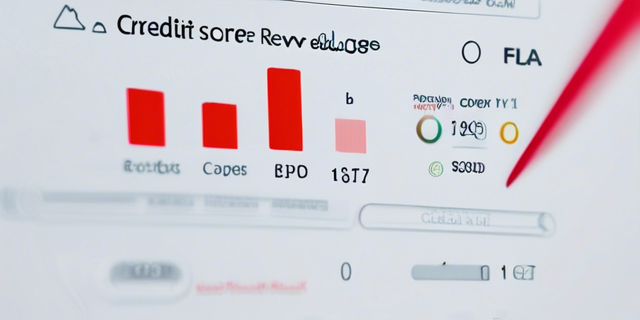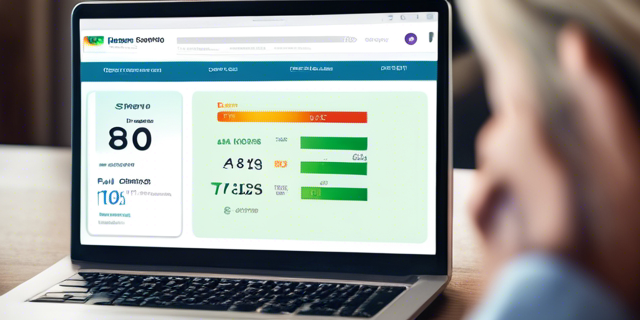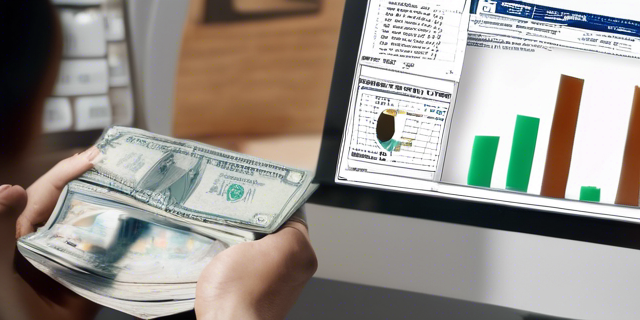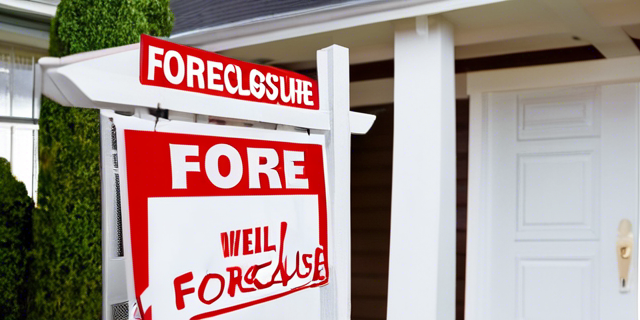Unlocking Debt Relief: Exploring Consolidation Options for Low Credit Scores 2024

In the ever-evolving landscape of personal finance, debt consolidation has emerged as a popular strategy for managing overwhelming debt. However, for those with low credit scores, the path to consolidation can seem like a daunting maze. Fear not, because in this comprehensive guide, we’ll navigate through the various options available, empowering you to take control of your finances and pave the way towards a debt-free future.
Understanding the Impact of Low Credit Scores
Before we dive into the consolidation options, let’s address the elephant in the room: low credit scores. A low credit score can be a significant barrier when seeking financial assistance, as lenders often perceive individuals with poor credit as high-risk borrowers. This perception can result in higher interest rates, stricter terms, or even outright denial of credit.
However, it’s crucial to remember that a low credit score is not a permanent condition. By implementing sound financial practices and exploring the right consolidation options, you can gradually improve your credit score and unlock more favorable lending opportunities.
Option 1: Peer-to-Peer Lending Platforms

In the digital age, peer-to-peer (P2P) lending platforms have emerged as a viable alternative to traditional banking institutions. These online platforms connect borrowers with individual investors willing to fund their loans. While credit scores are still a consideration, P2P lenders often take a more holistic approach to evaluating borrowers, considering factors such as income, employment history, and debt-to-income ratio.
Popular P2P lending platforms include:
One of the advantages of P2P lending is the potential for lower interest rates compared to traditional personal loans or credit cards, especially for borrowers with less-than-perfect credit scores.
Option 2: Credit Union Debt Consolidation Loans
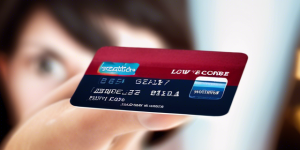
Credit unions are member-owned, not-for-profit financial institutions that often offer more flexible lending criteria and competitive interest rates. Unlike traditional banks, credit unions may be more willing to consider applicants with low credit scores, particularly if they are existing members with a positive history.
When exploring credit union debt consolidation loans, be prepared to provide detailed information about your financial situation, including income, expenses, and a plan for repayment. Many credit unions also offer credit counseling services to help members develop a comprehensive debt management strategy.
Option 3: Secured Debt Consolidation Loans
If your credit score is particularly low, you may need to consider secured debt consolidation loans. These loans require collateral, such as a vehicle, home equity, or other valuable assets, to secure the loan. By putting up collateral, you demonstrate a higher level of commitment and reduce the lender’s risk, potentially increasing your chances of approval.
However, it’s essential to approach secured loans with caution, as failing to make timely payments could result in the loss of your collateral. Thoroughly evaluate your ability to repay the loan before risking valuable assets.
Option 4: Debt Management Plans

For individuals struggling with multiple credit card debts, a debt management plan (DMP) offered by a reputable credit counseling agency can provide a structured path to consolidation. These agencies negotiate with your creditors to reduce interest rates and establish a single monthly payment plan.
While enrolling in a DMP can initially impact your credit score, making consistent on-time payments can gradually improve your credit over time. Additionally, many creditors view participation in a DMP as a positive sign of commitment to repaying debt.
When considering a DMP, research agencies accredited by organizations such as the National Foundation for Credit Counseling (NFCC) or the Financial Counseling Association of America (FCAA).
Option 5: Debt Settlement Programs
Debt settlement programs involve negotiating with creditors to accept a lump sum payment that is less than the total amount owed. While this option can provide significant debt relief, it comes with several caveats.
First, debt settlement can have a severe negative impact on your credit score, as you’ll essentially be defaulting on your debts before the settlement is reached. Additionally, the forgiven debt may be considered taxable income by the IRS, potentially resulting in an unexpected tax bill.
If you decide to pursue debt settlement, exercise caution and carefully research reputable firms with a proven track record. Avoid companies that make unrealistic promises or charge excessive upfront fees.
Option 6: Borrowing from Retirement Accounts

In situations of dire financial need, some individuals may consider borrowing from their retirement accounts, such as 401(k)s or IRAs, to consolidate debt. This option allows you to access funds without incurring additional debt or undergoing a credit check.
However, borrowing from retirement accounts should be a last resort, as it can significantly impact your long-term financial security. Early withdrawals may also incur penalties and taxes, further diminishing your retirement savings.
If you choose to explore this option, consult with a financial advisor to fully understand the implications and develop a solid repayment plan.
Option 7: Home Equity Loans or Lines of Credit
For homeowners with sufficient equity, a home equity loan or line of credit (HELOC) can provide access to funds for debt consolidation. These loans use your home as collateral, potentially offering lower interest rates than unsecured personal loans or credit cards.
However, it’s crucial to remember that by using your home as collateral, you’re putting it at risk if you fail to make timely payments. Additionally, the interest paid on home equity loans or HELOCs may not be tax-deductible under the current tax laws.
Before pursuing this option, carefully evaluate your ability to repay the loan and consider the potential impact on your long-term financial goals.
Option 8: Debt Consolidation Credit Cards
If your credit score falls within the fair or good range, you may be eligible for a debt consolidation credit card. These cards often offer promotional 0% APR periods, allowing you to transfer outstanding balances from multiple accounts and pay them off interest-free for a set duration, typically 12-18 months.
To maximize the benefits of a debt consolidation credit card, it’s essential to have a plan in place to pay off the entire balance before the promotional period ends. Additionally, avoid using the card for new purchases, as this can quickly negate the interest savings.
When comparing consolidation credit card offers, pay close attention to balance transfer fees, annual fees, and the regular APR that will apply after the promotional period.
Option 9: Personal Loans from Online Lenders
In recent years, online lenders have emerged as a competitive alternative to traditional banks, offering personal loans with less stringent credit requirements. While interest rates may be higher for borrowers with low credit scores, these lenders often provide faster approval processes and more flexible repayment terms.
When exploring online personal loan options, be sure to research the lender’s reputation, read customer reviews, and carefully evaluate the terms and conditions. Look for lenders that offer transparent pricing, no hidden fees, and flexible repayment schedules.
Option 10: Seek Professional Guidance
Navigating the world of debt consolidation with a low credit score can be overwhelming, especially when faced with a multitude of options and complex financial terminology. In such situations, seeking guidance from a trusted financial advisor or credit counselor can be invaluable.
These professionals can provide personalized advice tailored to your unique financial situation, helping you evaluate the pros and cons of various consolidation options and develop a comprehensive debt management strategy.
When selecting a financial advisor or credit counselor, look for credentials from accredited organizations, such as the Certified Financial Planner Board of Standards (CFP Board) or the National Foundation for Credit Counseling (NFCC).
Conclusion: Exploring Consolidation Options for Low Credit Scores 2024
Consolidating debt with a low credit score may seem like an uphill battle, but with perseverance and the right strategies, you can overcome this challenge and regain control over your financial future. The key lies in exploring all available options, carefully evaluating the terms and conditions, and developing a realistic repayment plan that aligns with your goals and circumstances.
Remember, a low credit score is not a permanent condition, and by consistently practicing sound financial habits and making timely payments, you can gradually improve your credit standing and unlock more favorable consolidation opportunities in the future.
The journey towards debt freedom may be long and arduous, but the rewards of financial stability and peace of mind are well worth the effort. Embrace the consolidation option that best suits your needs, remain disciplined in your repayment strategy, and celebrate each milestone along the way.
FAQs: Exploring Consolidation Options for Low Credit Scores 2024
1. Will consolidating my debt negatively impact my credit score?
The impact on your credit score depends on the consolidation method you choose. Some options, such as debt settlement or opening a new credit account, may initially cause a temporary dip in your score. However, making consistent on-time payments can gradually improve your credit over time.
2. Can I consolidate my debt if I have a bankruptcy on my credit report?
While a bankruptcy can significantly impact your credit score and make it more challenging to secure consolidation loans, it is still possible to explore options such as debt management plans or secured loans. However, you may face higher interest rates or stricter terms.
3. How long does it take to improve my credit score after consolidating debt?
The timeline for improving your credit score after consolidating debt varies based on several factors, including your payment history, credit utilization, and the age of your credit accounts. Generally, you can expect to see gradual improvements within 6-12 months of consistent on-time payments.
4. Can I consolidate student loan debt with other types of debt?
While it is possible to consolidate student loan debt with other types of debt, such as credit card or personal loan balances, it is generally not recommended. Student loans often have unique repayment terms and forgiveness options that may be lost if consolidated with other debt.
5. What happens if I miss payments on my consolidated debt?
Missing payments on your consolidated debt can have serious consequences, including late fees, penalty interest rates, and negative impacts on your credit score. It can also potentially lead to default and collection actions by the lender. Prioritize making timely payments to avoid these setbacks and maintain progress toward becoming debt-free.

